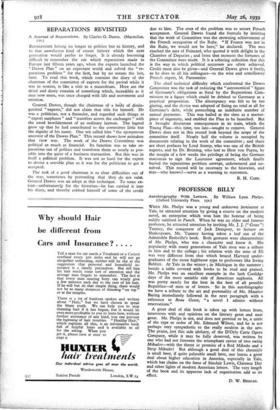PROFESSOR BILLY
Autobiography With Letters. By William Lyon Phelps. (Oxford University Press. 15s.)
WHEN Mr. Phelps was a young and unknown instructor at Yale, he attracted attention by giving a course on the modem novel, an enterprise which won him the honour of being mildly satirised in Punch. When he was an older and famous professor, he attracted attention by inviting Mr. J. J. (" Gene ") Tunney, the conqueror of Jack Dempsey, to lecture on Shakespeare, Mr. Tunney having taken a leaf out of the Admirable Bashville's book. Both gestures were characteristic of Mr. Phelps, who was a character and knew it. His popularity with many generations of Yale men was a tribute to him and to the college ; his relation with the sons of Eli was very different from that which bound Harvard under- graduates of the more highbrow type to professors like Irving Babbitt. At Yale in the winter ; in Michigan in the summer ; beside a table covered with books to be read and praised, Mr. Phelps was an excellent example in the lush Coolidge days of the more amiable side of American euphoria. All was pretty nearly for the best in the best of all possible Republics—of men or of letters. So in this autobiography we have a tribute to the art and personality of Mr. Maurice Baring immediately followed in the next paragraph with a reference to Beau Geste, "a novel I admire without reservations."
A great deal of this book is taken up with letters from, interviews with and opinions on the literary great and near great. Mr. Phelps is not, and does not pretend to be, a critic of the type or order of Mr. Edmund Wilson, and he is not perhaps very sympathetic to the really modem in the arts. The praise, just this side idolatry, of the D'Oyly Carte Opera Company, while it may be fully deserved, was written by one who had not foreseen the triumphant career of two swing Mikados—with the threat or promise of a Red Mikado and a Strip Mikado! But although a good deal of this chronicle is small beer, if quite palatable small beer, one learns a great deal about higher education in America, especially in Yale, which has claims on the fame of Sinclair Lewis, Clarence Day and other lights of modem American letters. The very length of the book and its apparent lack of organisation add to its effect.
D. W. BROGAN.


























































 Previous page
Previous page